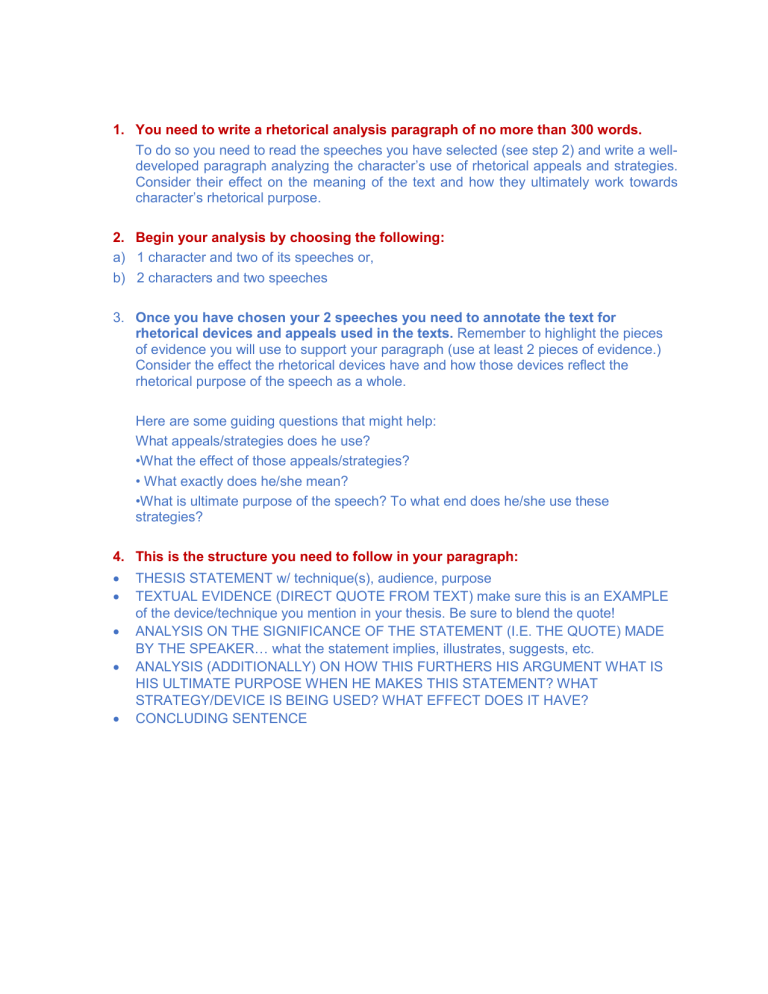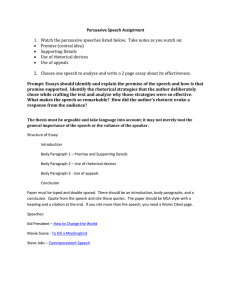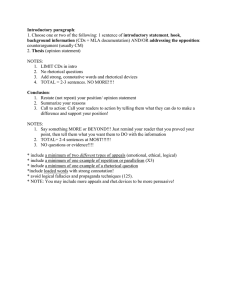
1. You need to write a rhetorical analysis paragraph of no more than 300 words. To do so you need to read the speeches you have selected (see step 2) and write a welldeveloped paragraph analyzing the character’s use of rhetorical appeals and strategies. Consider their effect on the meaning of the text and how they ultimately work towards character’s rhetorical purpose. 2. Begin your analysis by choosing the following: a) 1 character and two of its speeches or, b) 2 characters and two speeches 3. Once you have chosen your 2 speeches you need to annotate the text for rhetorical devices and appeals used in the texts. Remember to highlight the pieces of evidence you will use to support your paragraph (use at least 2 pieces of evidence.) Consider the effect the rhetorical devices have and how those devices reflect the rhetorical purpose of the speech as a whole. Here are some guiding questions that might help: What appeals/strategies does he use? •What the effect of those appeals/strategies? • What exactly does he/she mean? •What is ultimate purpose of the speech? To what end does he/she use these strategies? 4. This is the structure you need to follow in your paragraph: THESIS STATEMENT w/ technique(s), audience, purpose TEXTUAL EVIDENCE (DIRECT QUOTE FROM TEXT) make sure this is an EXAMPLE of the device/technique you mention in your thesis. Be sure to blend the quote! ANALYSIS ON THE SIGNIFICANCE OF THE STATEMENT (I.E. THE QUOTE) MADE BY THE SPEAKER… what the statement implies, illustrates, suggests, etc. ANALYSIS (ADDITIONALLY) ON HOW THIS FURTHERS HIS ARGUMENT WHAT IS HIS ULTIMATE PURPOSE WHEN HE MAKES THIS STATEMENT? WHAT STRATEGY/DEVICE IS BEING USED? WHAT EFFECT DOES IT HAVE? CONCLUDING SENTENCE HINTS!! In a rhetorical analysis, it’s crucial that the thesis statement identifies the purpose of the rhetoric (speech) what techniques are being used to convince the audience. The audience • Consider using some form of an “in order to …” statement to ensure that you identify the speaker’s purpose. Sample thesis: In his speech to the citizens of Thebes, Creon utilizes both ethical and logical appeals in order to assert his newfound authority and to justify his decree denying Polyneices a burial Note: You don’t have to have two purposes; this will vary depending on the text with which you are working. •AVOID saying “he uses ethos/pathos/logos • DO SAY, he/she makes ethical/emotional/logical appeals, OR he appeals to the [audience's] sense of logic, emotion (be sure to name emotion, e.g. fear, guilt, grief, etc.) Notes on Analysis Should not define the device you’re addressing Should not repeat itself Should not summarize the plot Avoid beginning analysis sentences with: By the reader By the author This quote This supports my topic sentence by… Should be specific to the text i.e. do not make general statements that can be applied to any work of fiction E.g. “The author’s use of foreshadowing helps build suspense.” Should ANALYZE the implications and effects of the concrete detail Should use specific adjectives in terms of the devices used. ALL imagery is vivid. ALL diction is specific. Those statements are vague and tell me nothing about the text. Sample paragraph on the next page Group 1 1. VALERIA HENRIQUEZ 2. VALERIA MACHUCA Group 2 (need to work on 3 speeches- only group of 3) 3. MAFER ALAS 4. GABRIELA AGUILAR Group 3 5. ADRIANA SUAREZ 6. MARIA ELISA MADRIGAL Group 4 7. LUCIANA NAVAS 8. LISSETTE PEREZ Group 5 9. DIANA SALAZAR 10. GRACIA MARIA MENDOZA Group 6 11. EMILY CRESPIN 12. VALENTINA MONTOYA Group 7 13. ADRIANA MOLINA 14. VALERIA MARTINEZ Group 8 15. SOFIA JARQUIN 16. CAMILA UMANA Group 9 17. MARCELA MACHUCA 18. CAMILA ACOSTA Group 10 19. LUCIANA PINEL 20. FER COLON Group 11 21. MARY G BOLAÑOS 22. GABRIELA GARCIA Group 12 23. MARIA ALEJANDRA DURAN 24. LAURA REYES Group 13 25. LUCIA TAVARONE 26. DANI FIGUEROA Group 14 27. JULIANA MONTOYA 28. ANA CAMILA MOLINA Group 15 29. ADRIANA MOJICA 30. MARIANA ZABLAH

